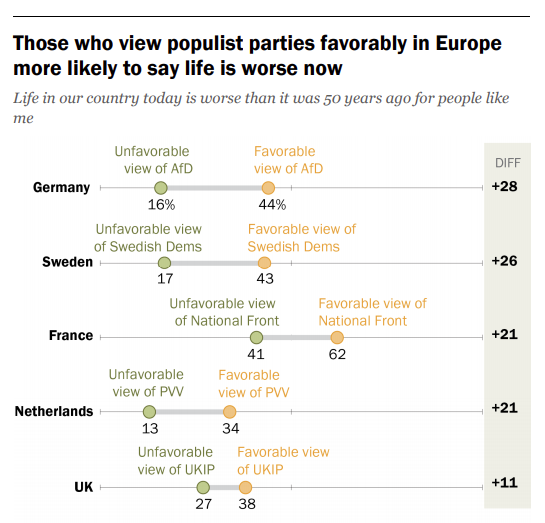What a difference half a century makes. Especially if you’re not living in the U.S.

Are you doing better than the previous generation? The Pew Research Center, a nonprofit think tank in Washington, D.C., asked nearly 43,000 people in 38 countries around the globe that question this past spring. Residents in 20 countries said people like them were better off than they were 50 years ago. In Vietnam, 88% felt better off, followed by India (69%), South Korea (68%), Japan (65%), Germany (65%), Turkey (65%), the Netherlands (64%), Sweden (64%), Poland (62%) and Spain (60%). Overall, 43% of people in those countries said they were better off.
All told, a majority of respondents in these 20 countries said they were better off.
However, the U.S. wasn’t one of them.
The U.S. was among the other 18 countries in which people said they were actually worse off than half a century ago. In Senegal, 45% felt this way, followed by Nigeria (54%), Kenya (53%), the U.S. (41%), Ghana (47%), Brazil (49%), France (46%), Hungary (39%), Lebanon (54%) and Peru (46%). Venezuela, which has suffered from political unrest and economic turbulence in recent years, was last on the list. Some 72% people there said they felt worse off than 50 years ago (only after Mexico, Jordan and Argentina).
Why the disparity between these countries? In Europe, populists tend to be more enamored of the past than people who disapprove of some of the continent’s right-wing parties. Germans who support the Alternative for Germany party are 28 percentage points more likely to say that life is worse for people like them than those who have an unfavorable view of the anti-immigrant party, researchers found. Another trend: More educated people are likelier to say life is better today, and in some countries young people are more positive on life in 2017 than their elders.
“Some of the most positive assessments of progress over the past 50 years are found in Vietnam, India and South Korea,” the report found. “All societies that have seen dramatic economic transformations since the late 1960s, not to mention the end of armed conflict in the case of Vietnam. A majority in Turkey also share a sense of progress over the past five decades.” That said, Pew’s analysis indicates that views of the current economy are also a strong indicator of whether people say life for people like them is better today than it was 50 years ago.
 In the U.S., the rich appear to be leaving the middle class behind. The American middle class made up just 26% of incomes in 2014, down from 46% in 1979, adjusted for inflation, according to a separate report released last June by the Urban Institute, a nonprofit and nonpartisan policy group. The upper middle class controlled 63% of all income in 2014, up from just 30% in 1979. And it isn’t because more middle-class Americans are richer: Middle-income households make up 120.8 million of the population, almost as much as upper middle-class and lower-income Americans combined.
In the U.S., the rich appear to be leaving the middle class behind. The American middle class made up just 26% of incomes in 2014, down from 46% in 1979, adjusted for inflation, according to a separate report released last June by the Urban Institute, a nonprofit and nonpartisan policy group. The upper middle class controlled 63% of all income in 2014, up from just 30% in 1979. And it isn’t because more middle-class Americans are richer: Middle-income households make up 120.8 million of the population, almost as much as upper middle-class and lower-income Americans combined.
Written by Quentin Fottrell for and published by Market Watch December 5, 2017.
FAIR USE NOTICE: This site contains copyrighted material the use of which has not always been specifically authorized by the copyright owner. We are making such material available in our efforts to advance understanding of environmental, political, human rights, economic, democracy, scientific, and social justice issues, etc. We believe this constitutes a ‘fair use’ of any such copyrighted material as provided for in section 107 of the US Copyright Law. In accordance with Title 17 U. S. C. Section 107, the material on this site is distributed without profit to those who have expressed a prior interest in receiving the included information for research and educational purposes. For more information go to: http://www.law.cornell.edu/uscode/17/107.shtml








